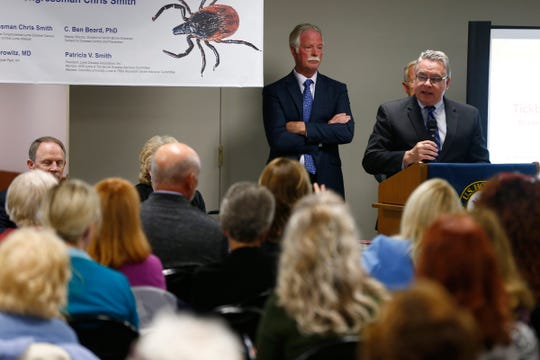Press Release
Smith: NIH 'All In' on Lyme Disease Research
Rep. Chris Smith (R-NJ), co-chair of the congressional Lyme Disease Caucus, today welcomed the National Institutes of Health’s (NIH) announcement of a new, expansive research strategy to combat Lyme disease. Priorities in the NIH multipart plan include: expanding knowledge of tickborne diseases; developing rapid diagnostic testing; identifying treatment success and human biomarkers of persistent symptoms; developing new treatments; and evaluating prevention approaches such as vaccines. “After lagging for decades, NIH is all in for researching Lyme and other tick-borne diseases to better diagnose and treat those suffering from this horrific disease,” said Smith, who has been on the forefront of federal Lyme disease efforts for more than 27 years. “This is great news for patients and Lyme-literate doctors who will now have serious, federal partners working aggressively to improve strategies for the detection, treatment, and one day, prevention of Lyme.” Smith said the NIH plan reads like the text of several of the bills he has introduced over the years pushing the federal government to establish a responsive, comprehensive, scientific strategy to help those gravely ill from Lyme and other tick-borne diseases. He said he will continue to fight for a larger coordinated effort across several agencies but added that “the NIH is among the most important federal agencies for fighting Lyme and this is a giant step in the right direction.” Smith is the author of the pending TICK Act (HR 3073), which will develop a whole-of-government National Strategy to prevent and treat Lyme and other vector-borne diseases. Smith’s legislation would create a new Office of Oversight and Coordination for Vector-borne Disease in the Department of Health and Human Services coordinating strategies across the entire federal government—including the NIH, and also the Departments of Defense, Agriculture, Interior, Homeland Security and the Environmental Protection Agency. In releasing its Strategic Plan for Tickborne Disease Research, the NIH said the effort was inspired in part by the 2018 Report to Congress by the HHS Tickborne Diseases Working Group. Smith spearheaded the legislation that created the Working Group, which became a provision (Section 2062) of the 21st Century Cures Act. “We had very high expectations that once we could establish a federal advisory commission or working group made up of Lyme-literate physicians, researchers and patients—we would have the data to move the federal agencies in the right direction. This NIH Strategic Plan is the most serious response to date and the Working Group gave them the road map,” Congressman Smith said. “We are greatly encouraged that the NIH has taken a key recommendation of the 2018 Working Group Report to develop a plan,” said Pat Smith (no relation), the President of the Lyme Disease Association, and an appointee on the federal Working Group. “The plan incorporates what Lyme Disease patients and advocates have been pushing for years. It will make a difference in the lives of hundreds of thousands of patients who have been greatly debilitated by this disease.”
|



